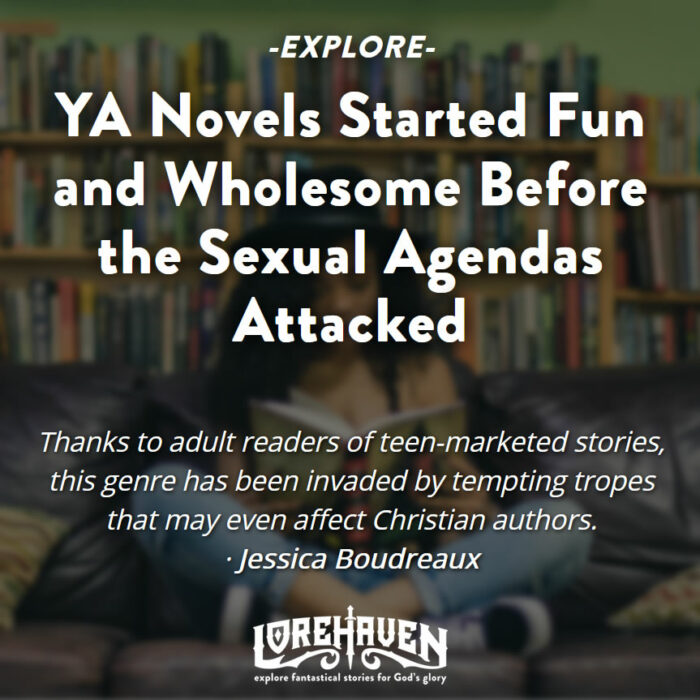YA Novels Started Fun and Wholesome Before the Sexual Agendas Attacked
More and more adults are reading “young adult” novels.1
I first realized this fact with the Harry Potter series. In 2001, the first Sorcerer’s Stone film version brought J. K. Rowling’s world to a wider audience. I hadn’t read the books, and felt surprised to find my college-age, childless friends devouring a series meant for kids. My best friend loved the series and said it didn’t matter that it was meant for kids. She said Rowling’s writing was amazing. At the time, I was skeptical.
Fast forward to 2011 when I began my original book blog. As a book reviewer, I read a variety of genres. But I didn’t realize many of these books were considered young adult (YA). I just thought they were good novels about teenagers.
So I began to pay attention.
YA novels reach beyond teens/young adults
Book publishers devote entire imprints of their publishing houses to YA books. This enormous market is filled with novels like The Hunger Games, A Court of Thorns and Roses, The 5th Wave, An Ember in the Ashes, and Shadow and Bone, just to name a few. And while these books are written for young adults, the Harry Potter trend continues. Adults are hooked. Why?
The simple and truthful answer is that good writing is good writing, regardless of the reader age for which it’s written.
For proof, I can cite my experience in reading YA myself. As a Christian, I was growing weary of sexual content in the adult fiction market. It seemed more and more rare to pick up a modern novel that didn’t have at least one explicit sex scene. So, I began going back to old favorites, and also leaned into the YA market.
YA offered what I wanted in adult market novels: a good plot, great characters, and an overall enjoyable read without over-sexualized content. Not too much to ask, right? As a result, I’ve enjoyed YA novels for many years, often leaving the adult market untouched, except in Christian fiction circles.
With both teens and adults reading YA, these books have become extremely marketable.
Sexualized content has taken over YA novels
But now YA novels are becoming increasingly sexualized. It’s becoming more difficult to find these books that aren’t either full of “spicy” scenes, or else centered on a character’s sexual identity.
Why is that? I can think of two logical reasons for adding this kind of content to Young Adult novels. And I don’t like either of them.
Option 1: This is a marketing ploy.
Want to bring more adults into YA? Then keep all the YA elements they love, but add more adult content. This essentially pushes young adults out of their own reading category, marketing to an age group that already has their own. It recklessly targets teens with content they shouldn’t read.
Option 2: This is a natural result of our changing world.
Modern teen readers are interested in sexual and gender identity. Or, if teens aren’t worrying about this themselves, scores of adults worry about it for them, and adults write YA novels. Adult authors may suppose that teenagers are either thinking about sex or having it anyway.
So why not put it in the novels they read?
Well, as adults, we should guide teens to make better choices, not give in to baser instincts. Could a novel sex scene do that? Probably. But is the scene necessary? Authors forget the literary option of fade-to-black, as if stories simply can’t explore adult themes without explicit sexual content.
And now, because teens aren’t the only readers for YA, we have adults reading explicit sex scenes with teenagers. That grosses me out. It ought to gross you out.
These tempting tropes could also affect Christian-made YA novels
But that’s the secular market, right? Surely the field of Christian YA is safe?
Mostly. Still, I’ve read Christian-made novels under Christian imprints containing unsuitable content. While the stories were not quite explicit, they shared too much descriptions of bodies and touching. That’s an extreme focus on the sensual.
Perhaps the reason is well-intentioned. Maybe the authors believe that by adding these elements in a milder sense, they can draw in secular readers while not offending their Christian audience. Unfortunately, that’s a moral compromise. Especially since the intended audience is teenagers. Young adult novels have become a battleground for their minds, and parents need to be aware of this.
But adults, especially Christians, are fighting the same war for their own minds. I believe all Christian novels should be free of explicit content, but YA should be even more so.
Once I found refuge from a world of adult content. Now I have to do my homework before reading any YA novel. I scan book reviews and look for words like “spice” or “steam” to warn about sensual content. Many reviews that contain those words use them positively, but I see them as a red flag. I suggest all readers of YA do the same, especially parents who purchase YA novels for their children.
I doubt there is much we can do about content in the secular market. But if we avoid books like this in the Christian market, perhaps making our frustrations known to the publishers who release such content, maybe we can keep the sensual edge out of YA novels released from major Christian publishers.
- Photo by Seven Shooter on Unsplash. ↩






























AMEN! Christian writers and publishers really need to tone down the sensuality in YA fiction.